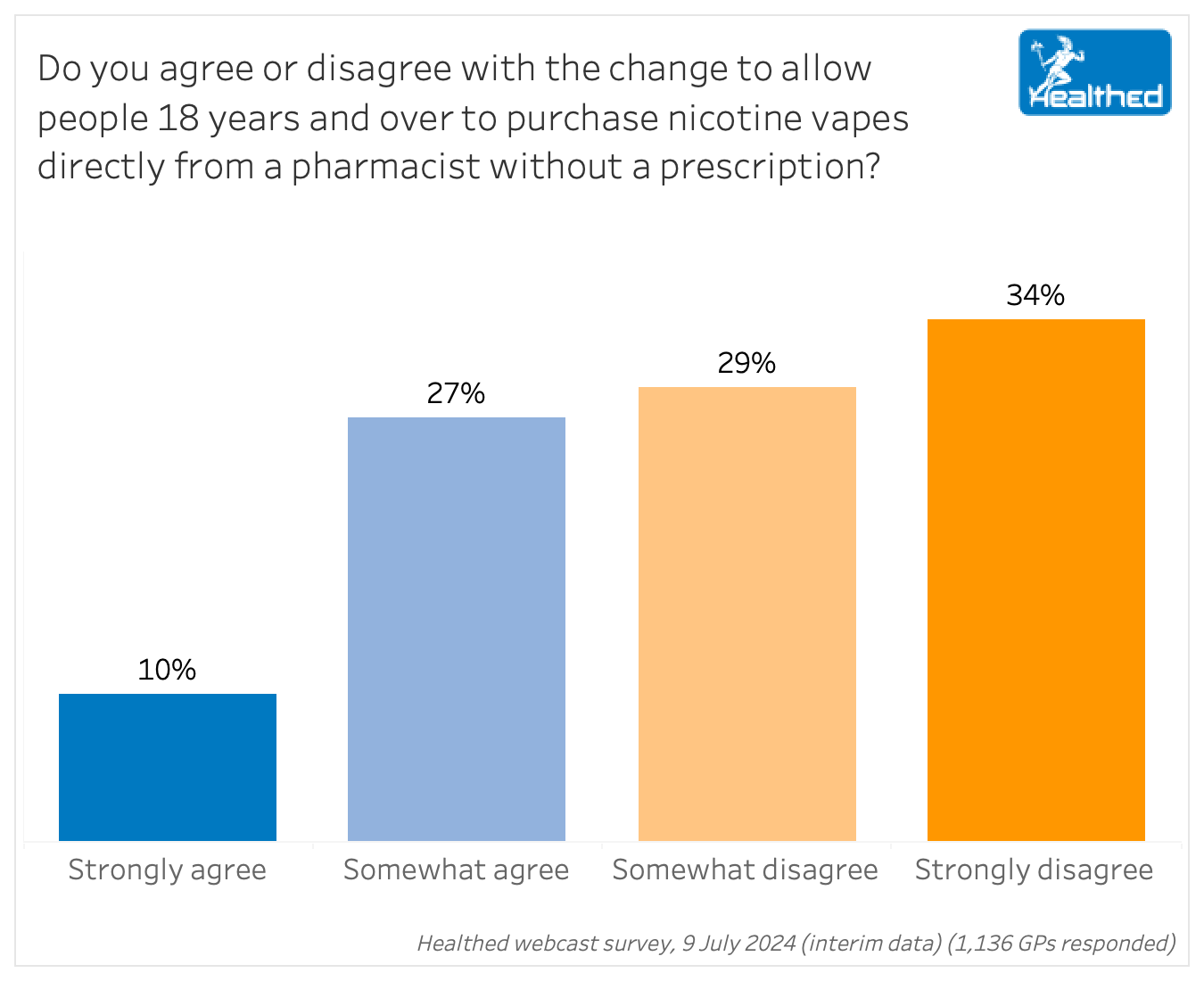Articles / Chemists to become vape shops?

From 1 October 2024, people 18 years or over will be able to purchase nicotine vapes directly from a pharmacy without a prescription — if any pharmacies are willing to sell them.
A bill banning retailers such as tobacconists, vape shops and convenience stores from selling any kind of vape, regardless of nicotine content, came into effect on 1 July.
But a week prior, the Greens negotiated significant amendments which mean that in three months, adults over 18 will no longer require a prescription to purchase nicotine vapes. Instead vapes will be available as a schedule 3 pharmacist-only medication from a chemist.
The Pharmacy Guild strongly opposes the amendments, as do virtually all major pharmacy groups.
“Pharmacists are healthcare professionals and community pharmacies do not want to supply this potentially harmful, highly addictive product without a prescription.” – Anthony Tassone, Vice President of the Pharmacy Guild of Australia
A national Healthed survey with more than 1100 respondents so far shows that GP opinion is not one-sided. While 63% are opposed to the change, 37% are in favour. However, those who disagreed with the change were much more likely to feel strongly about it than those who agreed.

Associate Professor Becky Freeman of University of Sydney’s School of Public Health has more than 20 years of experience in tobacco control. She called the removal of the prescription requirement “disappointing.”
“This weakens control of a highly addictive and unsafe product,” she wrote in the Conversation. But she said the amended bill “is a clear improvement on the current situation, where vapes retailers have saturated communities, including near schools.”
Dr Colin Mendelsohn, a GP who now specialises in tobacco treatment, says the pharmacy model is an improvement over the prescription model – but is still problematic.
“Most pharmacists are not willing to dispense vapes and most vapers are not willing to go to a pharmacy for supplies.”
“The likely outcome is that the black market will continue to supply the majority of products including young people with unregulated devices,” Dr Mendelsohn says.
He argues that vapes should be regulated as adult consumer products and sold from licensed retail outlets.
“This model is working well in New Zealand and the UK, and provides better support for smokers, reduced youth vaping and will start to eliminate the rampant black market, which is controlled by criminal networks.”
Some GPs in Healthed’s survey felt that dropping the requirement for a prescription for those over 18 would help prevent the black market.
“They are going to access it illegally if it’s not available. At least this way it can be monitored and they won’t be sold poor quality products,” one GP commented.
People under 18 will still need a prescription to access vapes, where state and territory laws allow it.
Until 30 September 2024, everyone needs a prescription from a doctor or nurse practitioner to purchase nicotine vapes from pharmacies.
All nicotine vapes in Australia are regulated as therapeutic goods, which must have plain packaging, cannot exceed certain nicotine concentration levels, and only come in mint/menthol or tobacco flavours.
What GPs are saying
Against the changes:
“If one is serious in dissuading the use of these devices then we should either ban them completely or make them as intended – a device to assist smoking cessation – otherwise you are only encouraging another means of addiction to flourish.”
“If they are available without a script then are the pharmacists really going to be able to adequately counsel people or are they just going to sell them to anyone who asks?”
“Getting a prescription from a medical practitioner offers an opportunity for them to discuss pros and cons of vaping with their regular doctors.”
“Who’s monitoring people’s lungs or their withdrawal program? Who’s addressing their mental health and other drug use?”
For the changes:
“It is still less harmful than smoking. It reduces cost to patients and chemists should be able to provide counsel for them.”
“I would not be prescribing vapes – I am happy for the pharmacists to have them.”
“Pharmacists should be able to discuss the safety of vaping with patients. Patients feel less threatened in a less formal setting and hopefully it will lead to less online illegal purchasing.”
Somewhere in the middle:
“Best of bad options – better than being banned, better than prescription-only because doctors time is in short supply in areas of underprivilege where the impacts of vaping are worst. At least it’s better than buying it elsewhere where the additives are unknown. However, non-prescription vaping available OTC may still mean people take up recreational vaping.”
“If they can purchase cigarettes without prescription, then nicotine vapes should be made accessible for people to choose, as they are safer in terms of the lack of other toxic substances in cigarettes. However, my hesitation is the possibility of misunderstanding that vapes are completely safe…therefore the pharmacist should be able to counsel them.”

RSV Prevention in Infants and Pregnant Women

STIs – Common and Tricky Cases

Role of Testosterone During Menopause - Evidence vs Hype

Vision and Driving Fitness: Key Insights for Health Practitioners
Yes
No
Listen to expert interviews.
Click to open in a new tab
Browse the latest articles from Healthed.
Once you confirm you’ve read this article you can complete a Patient Case Review to earn 0.5 hours CPD in the Reviewing Performance (RP) category.
Select ‘Confirm & learn‘ when you have read this article in its entirety and you will be taken to begin your Patient Case Review.
Menopause and MHT
Multiple sclerosis vs antibody disease
Using SGLT2 to reduce cardiovascular death in T2D
Peripheral arterial disease
